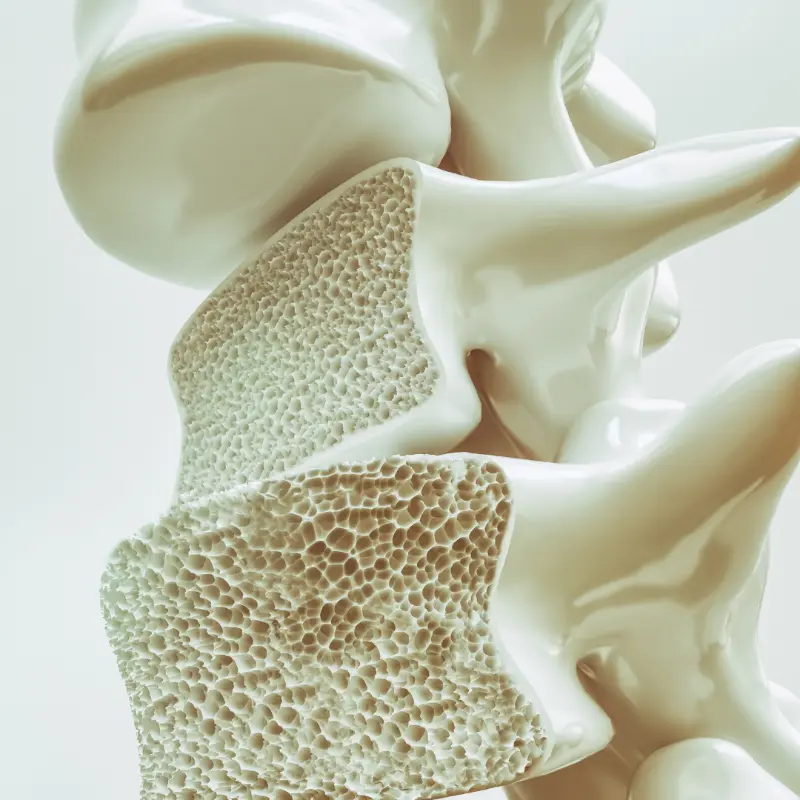Osteoporosis, a condition that weakens the bones and makes them more susceptible to fractures, is a common health concern for many people as they age. But what exactly is osteoporosis? And what happens to your body when you have this condition? Let's delve into these questions and explore the impact of aging on osteoporosis.
Understanding Osteoporosis
Before we delve into the effects of aging with osteoporosis, it's crucial to understand what osteoporosis is. Osteoporosis is a bone disease characterized by decreased bone strength, which increases the risk of broken bones. The term "osteoporosis" literally means "porous bone." When viewed under a microscope, healthy bones appear like a honeycomb. However, bones affected by osteoporosis show larger holes and spaces in the honeycomb structure, indicating loss of bone density or mass.
Osteoporosis can affect anyone but is most common in older women. According to the National Osteoporosis Foundation, about one in two women and up to one in four men over 50 will break a bone due to osteoporosis.
The Progression of Osteoporosis with Age
As we age, our bodies naturally lose bone mass. This process accelerates for women after menopause due to lower levels of estrogen, a hormone that helps protect against bone loss. If you have osteoporosis, this natural process of bone loss happens faster than your body's ability to create new bone tissue.
In the early stages of osteoporosis, you may not experience any symptoms. However, as the disease progresses and your bones weaken further, you may notice signs such as back pain caused by fractured or collapsed vertebrae or loss of height over time due to spinal compression fractures.
The Impact on Daily Life
Living with osteoporosis can significantly impact your daily life. As the disease progresses, it can lead to severe complications such as fractures, which are the most serious health risk for people with osteoporosis. Fractures can occur even from minor falls or actions like bending over or coughing. The most common areas of fracture are the hip, spine, and wrist.
Hip fractures can be particularly dangerous for older adults. They often require surgery and prolonged rehabilitation, and they significantly increase the risk of disability and dependence on others for care.
Spinal or vertebral fractures can also have serious consequences. They can cause severe back pain, loss of height, deformity (a stooped or hunched posture known as kyphosis), and decreased mobility.
Regenerative Medicine as a Treatment
Recent advancements in regenerative medicine offer promising alternatives for treating osteoporosis. This innovative approach focuses on harnessing the body's natural healing mechanisms to stimulate bone regeneration and improve bone density. Through techniques like cellular therapies, regenerative medicine aims to enhance bone health and potentially reduce the risk of fractures associated with osteoporosis.
Preventing and Managing Osteoporosis
While osteoporosis is a serious condition that can have significant impacts on your health and quality of life as you age, it's not inevitable. There are steps you can take to prevent osteoporosis or manage it if you've already been diagnosed.
Regular exercise is crucial for maintaining bone health. Weight-bearing exercises like walking, jogging, dancing, and weightlifting stimulate bone formation and slow down bone loss.
A healthy diet rich in calcium and vitamin D is also essential for bone health. Calcium is a key building block for your bones, while vitamin D helps your body absorb calcium.
If you're at high risk of osteoporosis or have already been diagnosed with the disease, your doctor may recommend medication to slow bone loss and reduce the risk of fractures.
Aging with osteoporosis presents unique challenges that require proactive management to maintain quality of life. Understanding what osteoporosis is and how it affects your body allows you to take steps to protect your bone health as you age. Remember that while osteoporosis is common in older adults, it's not an inevitable part of aging – with proper care and management; you can lead a healthy, active life even with this condition.
Beeson Wellness Center offers an array of treatment options to help manage Osteoporosis. From Regenerative Medicine and Exercise to Diet and Lifestyle guidance, we are here to help you along your wellness journey.

